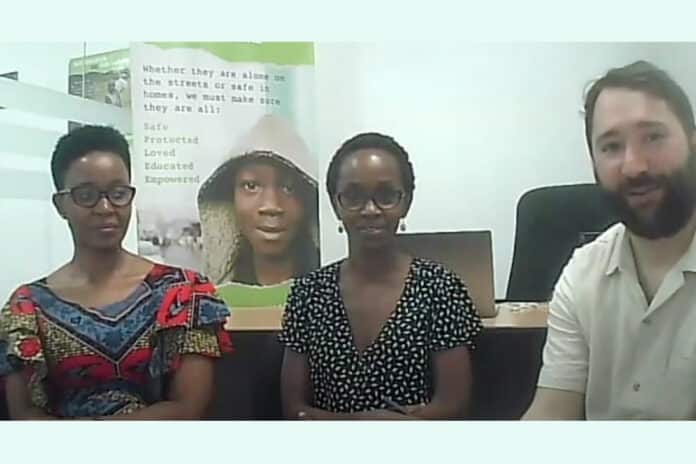Mary Mushi, a training officer for the Railway Children charity in Tanzania, finds it hard to put into words the best part of her job.
Every year thousands of children across the UK, India and East Africa run away or are forced to leave homes that have become unbearable through poverty, abuse, violence and neglect.
Thanks to the support of the UK rail industry, the Railway Children charity provides protection and opportunity for children with nowhere else to go and nobody to turn to.
“Seeing that child be reunited with their parents and the different emotions is the best part as they are always grateful to be back together,” said Mary.
“We’ve had several cases in which the child has been living on the streets for so long that their parents have thought the child was dead.”
Mary was joined by programme manager Mary Gatama for the charity’s first virtual Q&A event from Dar es Salaam in Tanzania, hosted by trust and grants officer Matt Zeqiri.
They talked about their experiences on the ground working with children at risk on the streets, the challenges they face on a daily basis and much more.
Mary Gatama said: “The majority of children we are working with in Tanzania are aged between 7 and 15 years old, and find themselves living on the streets for a whole range of reasons including neglect, abuse, violence and poverty.
“Our focus for the younger children is on immediate needs such as medical needs and family reintegration, while for the older ones our priority is on self-reliance and giving them the tools needed to look after themselves, integrate back into society and find employment.”
The charity works in several cities across Tanzania and also around the rail networks in India where a child arrives alone on a station platform every five minutes. Rape and sexual violence are common experiences for many children on the streets, with girls particularly at risk. Food, clothing and shelter are hard to come by, and children resort to scavenging on rubbish dumps or being exploited and made to work.
Mary Mushi said: “We work six days a week looking for children during the day, and during the night. With the help of community champions, we map out areas to find out where they are sleeping, and listen to them about issues, and how we can support them.
“The key is to listen to the children and build relationships to understand how we can help. The earlier we can help them, the easier it will be to get them off the streets.”
Last year Railway Children marked a major milestone by celebrating its tenth anniversary of working in Tanzania, in which time it has worked with around 10,000 desperate children.
The organisation works at three levels to make sure the impact they have is long-term and sustainable:
– Street level – working to meet the immediate needs of children at risk on the streets right now. Outreach workers spend time with children, urging them to consider a life away from the streets, and providing a safe place to stay while working out the best long-term solution for their individual circumstances. Where the charity can, it works to reunite children with their families.
– Community level – it strives to make children on the streets visible to society and to help people understand the issues that cause children to run away and that face them on the streets. Initiatives help the wider community to see children on the streets in East Africa as vulnerable and in need of help, rather than the common perception of them as troublemakers and criminals.
– Government level – working locally to help under-resourced government departments create the structures that are needed to protect children on the streets. Laws and policies are in place, but the knowledge, skills and resources aren’t there locally to ensure the law is adhered to and policies brought to life.
Mary Gatama said: “COVID has really pushed us to be more creative in ensuring we can keep services running, while keeping everybody safe and also educating people about COVID.
“We’ve been providing staff with face masks and sanitiser and we’ve also utilised technologies such as using phone calls to keep in touch with families, when in the past we’d have also spoken with them face-to-face.
“In some cases, we’ve bought families basic phones so we could reach them, and they could reach us in cases of crisis. We’ve also received a small grant to provide bucket, taps and soap which have been placed in communities to ensure people can wash their hands.”
Last week, 350 people in the UK slept out on the floors of railway stations as part of Railway Children Sleepout 2022, raising more than £160,000. It is one of several vital fundraisers ensuring work like that in Tanzania can continue and grow.
Concluding the interview with Matt in Tanzania, Mary Gatama said she was very grateful to everyone raising money for the charity.
“We really appreciate the support that everyone has been able to provide for us,” she said. “We would not be able to do what we do without that support.
“It is changing children’s lives, family lives, and having a longer-term impact in that we are breaking the cycles of a children who could have ended up growing up on the street, or not having made it to grow up at all, to now being reunited with families or finding work.
“We are really grateful we can do when we can do and that is thanks to what you have all been doing. Asante Sana (thanks a lot).”
Click here for more details about the charity.
Photo and video credit: Railway Children







































 0113 2082620
0113 2082620 info@railbusinessdaily.com
info@railbusinessdaily.com 15 Mariner Court, Wakefield WF4 3FL
15 Mariner Court, Wakefield WF4 3FL

